July 18, 2024
This interview is part of the Center for Irish Music's story-sharing project, "Many Paths to Handing Down a Tradition." Click here to learn more!
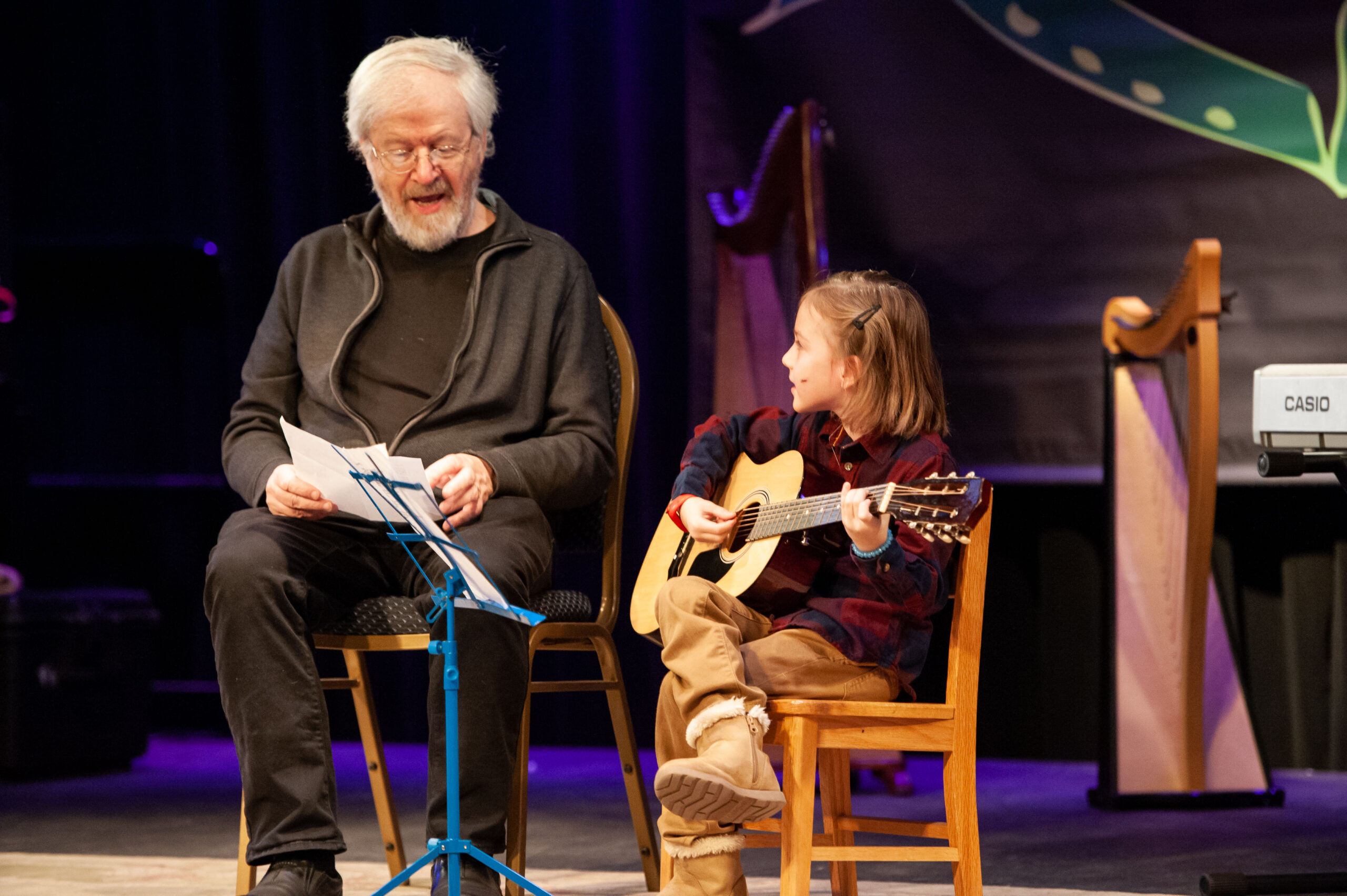
Dáithí Sproule performs with a young student at the Center for Irish Music's 2019 Fall Youth Recitals.
CIM is truly lucky to have many teachers who dedicate their lives to the love of Irish music, and the mastery of their instruments. One of them is Dáithí Sproule, a deeply respected teacher and musician in the Irish music scene, credited by many as the inspiration for DADGAD guitar playing in Irish music. Dáithí also loves the fiddle. Many students and musicians enjoy his classes, deep curiosity for the tradition, and a lifelong dedication to learning. We are delighted to bring his story to you.
Sook Jin: Dáithí, how wonderful to be here with you today. Let’s begin with a story of yourself, your background, and your earliest memory of traditional Irish music.
Dáithí: I’m from Derry, in the north of Ireland. Derry City is on the border between the part of Ireland still under British rule and the Republic of Ireland. The border divided us from our natural communities and hinterland. The majority of people in Derry City are Catholic, born into a situation divided by religion. There was only one Protestant family on our street. There immediately was a focus on identity. From childhood, I was already thinking of prejudice, racism, division. In one sense, identity has been a factor all of my life. Being from Derry, growing up in Derry at that particular point in time, has been a big part of my life. Derry was the old name, and Londonderry was the name given by the settlers who occupied the land. When the Troubles started, if the army asked where you are going or where you are from, if you said Derry, it’s likely you’re Catholic and possibly Nationalist, and if you said Londonderry, you’re likely Protestant.
Identity is very particular. In life, everything is very particular. Generalization is the basis of prejudice.
When I was a child, there was no such thing as sessions, traditional music gigs, hardly any traditional music records, the term "traditional music" wasn’t even mentioned. There was "Irish music". I was in a family of 7 children and 4 elders. The elders had an involvement with what we now call traditional music. In Derry, Irish music came about regularly once a year for most people during the Feis. The word is now mostly connected with dancing in the U.S., but music was a much bigger part of it for me. There were competitions for individual singing, choirs, fiddle, piano. I was put into the singing parts of it when I was young. The style of the music, though, was mostly not traditional, but parlor-style "classical" singing and playing. The solo songs I learnt for Feis competitions were all in Irish and that was my first substantial experience with the Irish language.
I grew up speaking English. I didn’t start learning Irish (apart from the songs and a few phrases) until I was 11 years old.
My father’s family were farmers, from the country. He would lilt Miss McLeod’s Reel when we were little as he dandled us on his knee, that was probably the most traditional thing I was raised with. Another tune he would lilt was Stirling Castle - we have Scottish connections way back, including my name, Sproule. He loved the Flogging Reel too. He, a city boy, would talk about what it was like when he visited his family in the country when he was young and how uncles, cousins and men working on the farm would occasionally play fiddle tunes in the house.
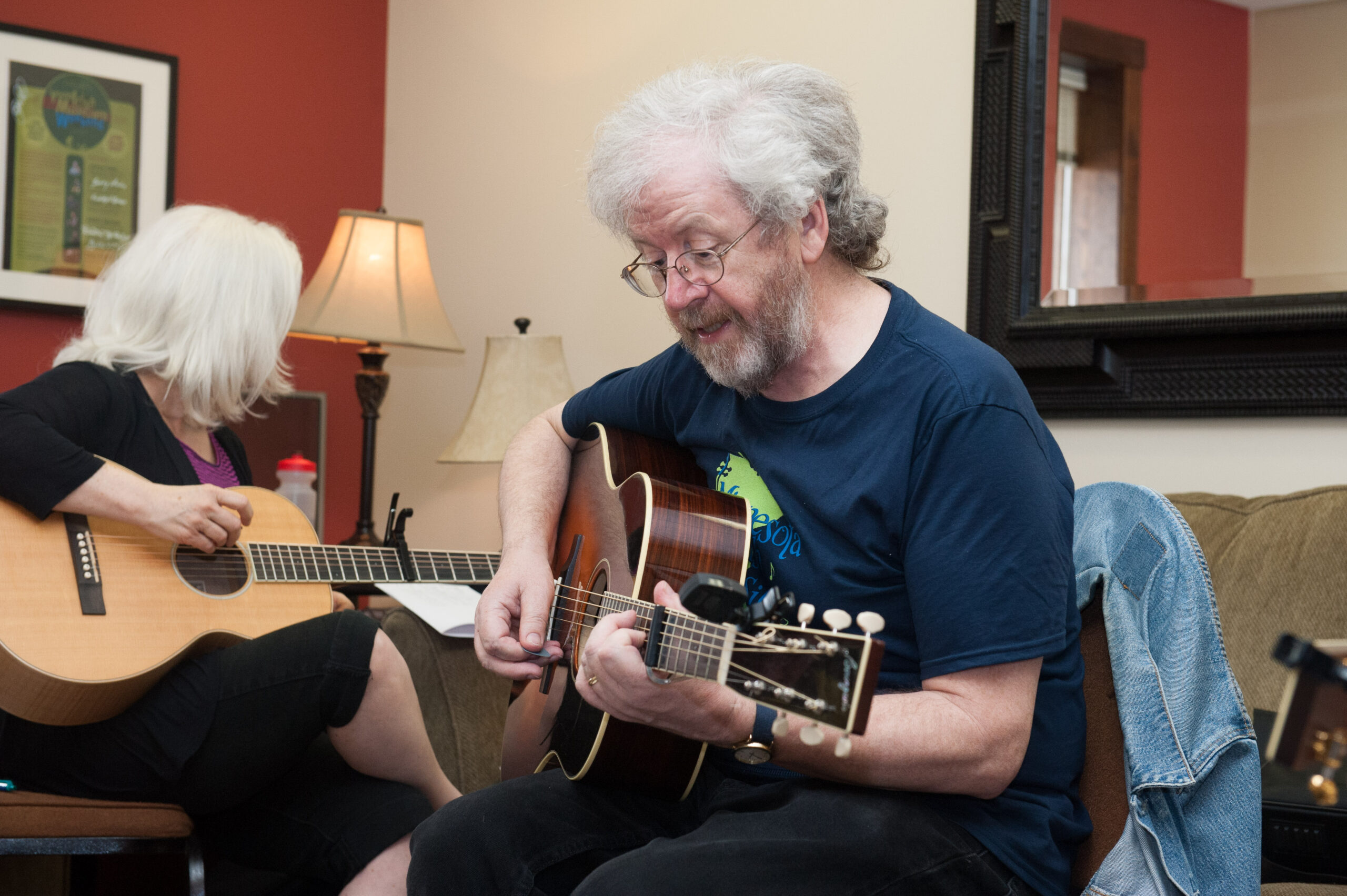
Dáithí teaches at the 2013 Minnesota Irish Music Weekend
In the 60s, there was this folk ballad boom in Ireland. People got guitars and made the connection that our old songs are folk songs too. When I started playing the guitar in 1967, there wasn’t the concept of a session or the words "session" and "gig". When I went to college in Dublin and I would play in the folk clubs with friends it would be called "a spot", not a gig, which would be a performance of ten or fifteen minutes.
Sook Jin: When did Irish music become more interwoven into your life? Who were some of the key people on your journey?
Dáithí: Mícheál Ó Domhnaill was my first gigging partner. His father's family were from the Donegal Gaeltacht of Rannafast where I would go every summer as a teenager to learn Irish. But we were also inspired by the Beatles music. This is where the stories are tangled! I was listening to the Beatles when I was younger, I learned chords on the piano by ear with some guidance from my uncle Colm, who lived with us, but was never formally taught. I used to go to the Gaeltacht every summer, and was taught songs in Irish there. I actually started guitar in the Gaeltacht, and staying in the house there with us was Mícheál Ó Domhnaill and also a Derry friend, Jim McCloskey, who had a guitar. Guitars were not common, so that was the first one I held. Jim showed me some chords and I did my very first guitar gig that same week with Jim and Mícheál and his brother Éamonn in Gweedore!
Those were the roots of what became our group Skara Brae with Mícheál and his sisters, Maighread and Tríona. When we went to college in Dublin in 1968, we played a lot in folk clubs. We got a connection to gigs on folk radio shows through one of Mícheál’s aunts who worked for RTE. We had a large repertoire of in English and Irish -- traditional but also blues and Beatles --but when we made the Skara Brae album, it was for an Irish-language record company, Gael Linn, so all the songs on that album were in Irish and that, I think, has shaped how people remember us.
But at that point, in the early 70s, I hadn’t fallen in love with jigs and reels yet! In college Mícheál, my friend Healy from Derry and I started a Comhaltas club - a kind of a session -- a chance for us to sing and play guitars. We sent out invitations. As far as my life and music are concerned, or anyone’s life and music, it’s really the luck of who you meet that counts. I had already met Mícheál and his sisters, but when we sent out the invitation, people like Fintan Vallely, Mary Bergin, Tony MacMahon, Tony Smith (Antóin Mac Gabhann) turned up. These were among the first great Irish musicians I saw close-up. I was playing in standard tuning, strumming along.
For a year or two after Skara Brae, I was playing mostly electric guitar and had rock bands. I loved electric blues. But a twist of fate occurred about 1974. I started going to the Gaelic League Club in Harcourt Street in Dublin - you have to be an Irish speaker to enter. A lot of people I knew went, and musicians loved it because you could stay up until late playing music and drinking. One night, I happened to be there with my guitar tuned in DADGAD and a friend asked me to accompany her on some tunes -- and it just worked -- in a way that it hadn't for me in standard tuning. So that led me back into tyhe traditional acoustic world. In another session about the same time, playing in DADGAD, my dear friend Tríona Ní Dhomhnaill, heard me accompany fiddle and said I should stick with that!
Shortly after that I started going to sessions led by the Kellys at the Four Seasons pub in Capel Street. A girlfriend of mine who was a neighbor of theirs said I should try it -- though she also said they hated guitars! -- I am astonished that I had the nerve to try playing there. John Kelly Senior, his sons James and John, Paddy O’Brien, Mick Gavin, the McEvoys, Joe Ryan, Bobby Casey, other legends that would be passing through, played there. Instantly I was allowed to be in this inner circle. They were just so very kind, and I kept my ears open, and learnt by strumming along. I did it about 2 to 3 nights a week for years, and it was my education, and became what I do every day ever since.
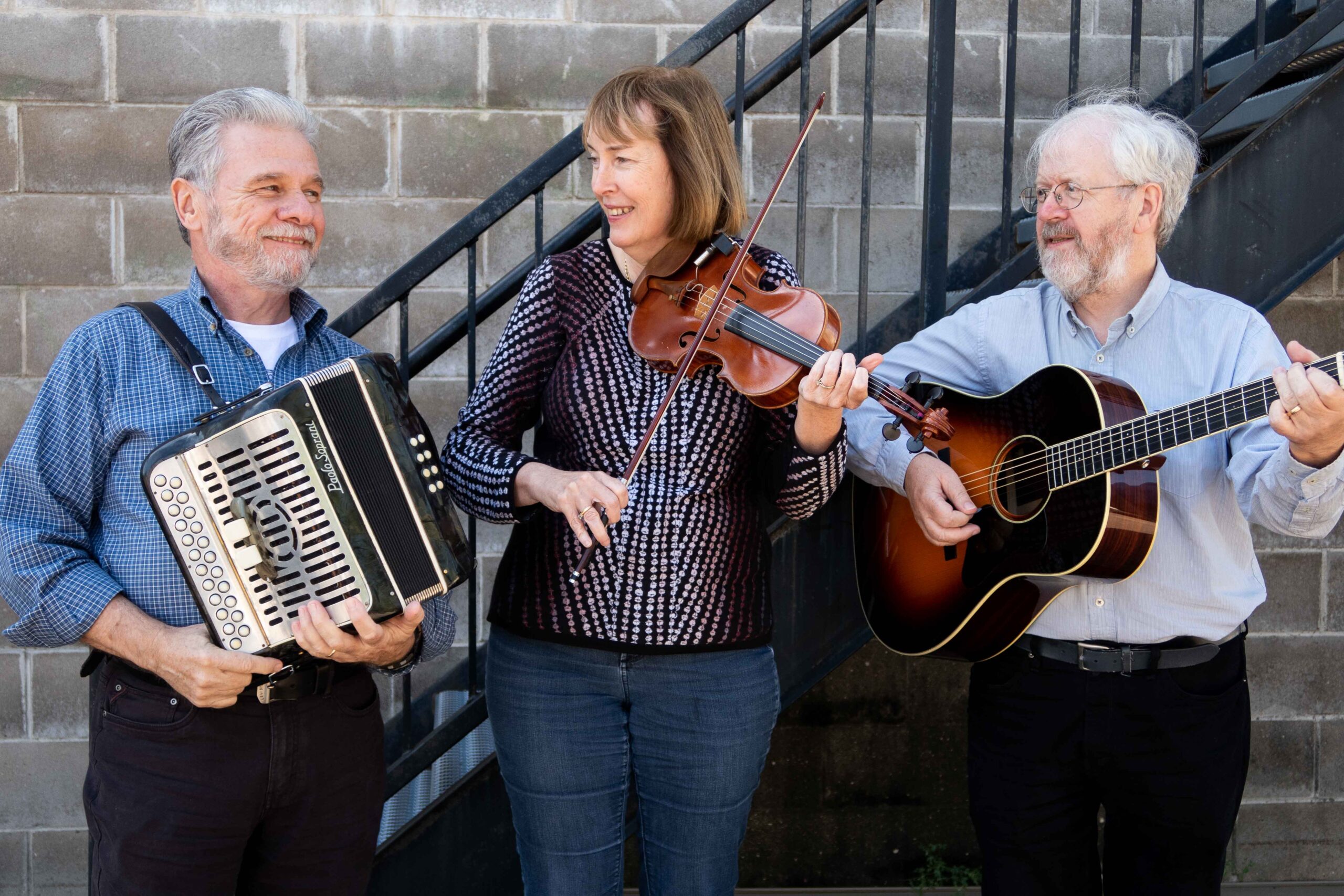
Dáithí with Trian bandmates Billy McComiskey and Liz Carroll during the Center for Irish Music's 2018 Harvest Home event.
Sook Jin: What does it mean to play Irish music in the context of the United States?
Dáithí: Around 1977, 1978, when I was still living and working as an editor in Dublin, James Kelly got invited to New York to make an album for Shanachie Records. Shanachie had started making great records and there weren’t many other Irish traditional records at that time, so when one comes out, everyone gets it and listens to it obsessively. They did one of Tommy Peoples and Paul Brady - The High Part of the Road - one of the first fiddle records I played on repeat. They offered James an album, so he asked me to accompany him. I refused him at first, I had no interest in going to America. He continued to try and persuade me, he invited Paddy O’Brien to join us, and I got into one of these rare bad moods with my scene in Ireland and said, "All right, I’ll go." We were supposed to go for a few months. We were playing in these bars in the Bronx, in Manhattan, from 10pm to 2am, 4am, mostly pretty empty bars with no one to chat up. But we did get to hear and hang out with some of the legends - Joe Burke, Andy McGann, Paddy and Johnny Cronin, among others.
I was ready to go back to Ireland, but the others wanted to stay. At one of my last nights there, we got together for a tune in Manhattan with Dan Collins of Shanachie, and played till very late in a fairly empty bar. There were two women with a man hanging out, and the rest of us began speculating on the nature of their relationship. When the trio were leaving, one of them leaned over, and stuck a big bill in my guitar - maybe $50 or $100 - and I thought to myself, I am on an adventure now! I could go back to my little nest in Dublin, which is what I would like to do, or stay on this adventure! So I did.
We visited the Twin Cities for the first time soon after, and met many wonderful musicians that were actively playing at sessions here, and also for céilí dancing. I liked the feel of Minnesota, of the people here, there is something about the physical feel of the place. James and Paddy and I thought the musicians here had really caught the style. We didn't agree with people who would say you had to be from Ireland to play Irish music right -- “Anybody can play Irish music, no matter where you are from. It doesn’t matter.”
I wasn’t aware if anyone among the musicians here had connections to Ireland -- apart of course from Martin McHugh. They were just playing good music. So we were really clear on that. Irish music has nothing to do with being Irish. It’s not a necessity, it’s a genre, it’s an art form, and anyone can participate in it. From my point of view, I got into Irish music because it was great music. I played other forms of music, too. But with other forms of music, say, electric blues music, I couldn’t just sit down and have a pint with Eric Clapton in a bar. But you could get on the bus in Dublin and go into the Four Seasons and be with the equivalent of Eric Clapton or Yehudi Menuhin in front of you, maybe strum or play along! It’s the quality of the music that drew me. I got interested in the music because I saw it in the most brilliant form. It is also such a sociable form of art. My father got to visit me in Dublin and went to the Four Seasons, and he said afterwards, “I couldn’t believe it! Everyone knows you and you know everybody!” This was a big change in my life!
Sook Jin: How do you envision your contribution to the traditional Irish music community and the Center for Irish Music?
I have got so much from the community here. When I first got here, I was instantly accepted. I was just delighted to be part of this thing, be a part of lovely groups with Laura (MacKenzie), Patty Bronson, Ross Sutter, Paddy (O’Brien), Jamie Gans, and so on. And to have the school (Center for Irish Music) now is unbelievable. I love teaching, I’ve always been an academic - taught at many places like the University of Minnesota and other schools. I love explaining things - I got this from my father, and love trying to understand things. When you have that compulsion, then you love to share that with others. I never got regular music teaching until CIM. It’s a gift at this time of my life, to talk about music, meet all the interesting mixture of people, to get challenged to teach.
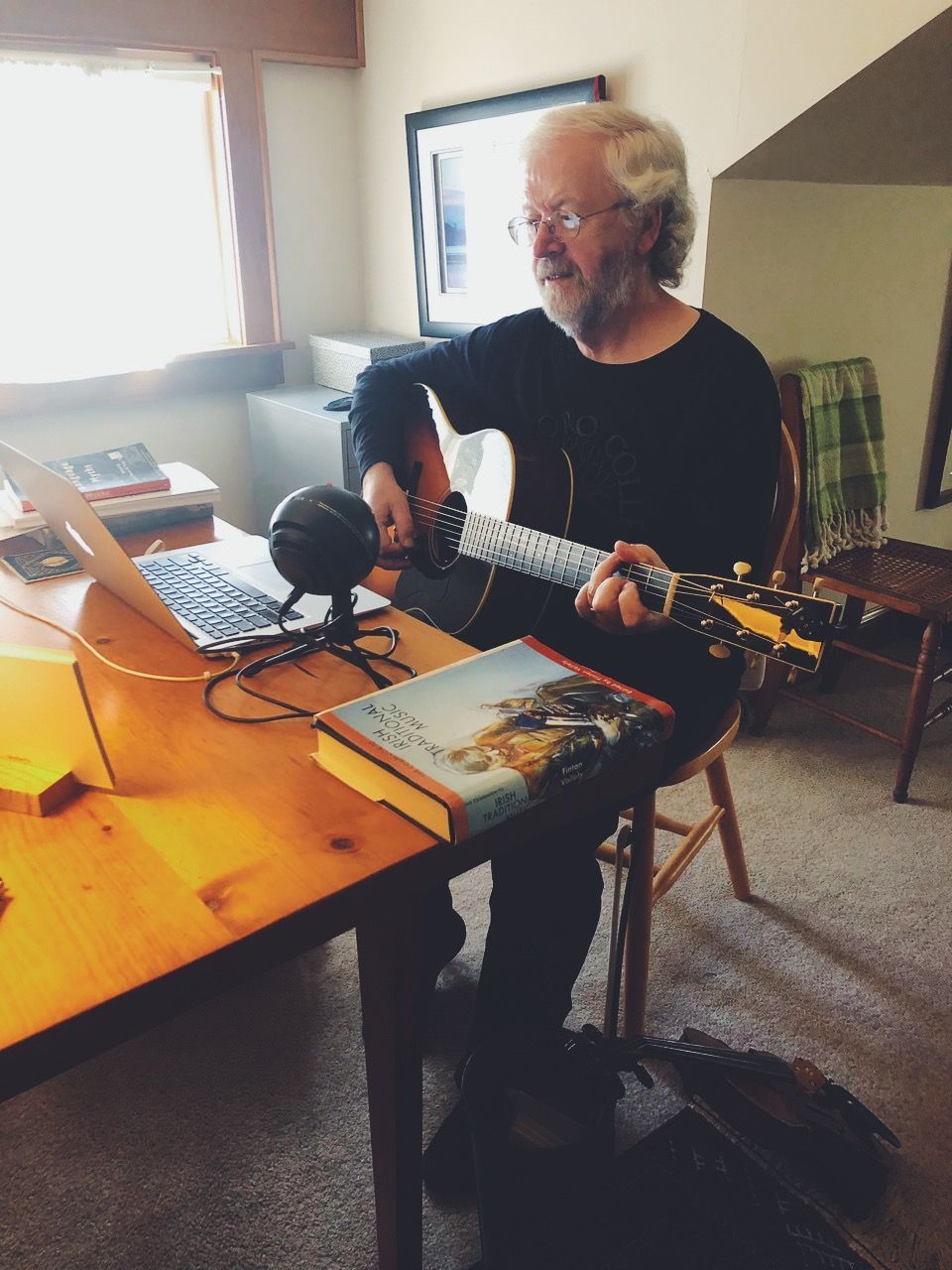
Dáithí teaching from "the Eagles Nest" (his home office) during the covid pandemic.
I have been lucky enough to have all these experiences, the Irish language, the great musicians I have known. I have the experience with the Gaeltacht, native speakers of the language, singers, storytellers, that I get to tell and share. To bring that world to this world and make it one world. I’ve been able to connect them. I had a moment in our house a few years ago that I often mention - there was a party/session and Adrienne O’Shea was there, so was Aria Strauss, and they each sang (individually) a song in Irish. And, as I listened, I was thinking, "Wouldn’t it be great for the people who I got these songs from, to be here in Minnesota and to hear their songs sung?" I was a channel for that, and I felt that my life has not been wasted after all - and that my interests and accumulation of experience were being passed on.
The idea of passing knowledge and experience on is obviously so important, in our individual lives and in the school. Sometimes it's as simple as mentioning the name of some musician or singer that the other person might never have heard of. I had the same experience myself from the other side because I had people like James or Paddy recommending names to me. A really good example for me is Ben Lennon, brother of Charlie Lennon. Everyone loved Ben Lennon, a great fiddler. I still haven’t been able to get any solo recordings from Ben Lennon -- home field recordings, say, but would love to. I got to play with him a little through the years and his playing was so subtle and intricate, there was such sensitivity in his playing, so difficult to accompany, I wish I had had a recorder then. Ben is on my mind because James Kelly, whom I respect so much, mentioned Ben as someone to pay special attention to. I hope when I recommend some musician or singer or bombard people with resources, they’ll take the time to listen to them. It’s like sowing seeds. They might not get to it immediately, but somewhere along the line it might just happen.
Sook Jin: How have your identities and life experiences shaped your Irish music journey? Any observations and insights from your own journey?
Certain aspects of Irish music in general have changed since I was a child - its profile, the number of people playing it, and so forth. Irish traditional music originally grew and developed -- both singing and instrumentals -- it grew up in a certain environment: little houses, with poor people, for their own entertainment. Irish music of the people had no harmony, no chords, everybody just played the same tune. If there was singing, it was one person, singing alone, to their friends and family, no need to project, not a performance. That dictated the nature of the music up to recently.
What has changed most in a way in my lifetime is that there’s been a lot of Irish music performed -- on stages, on video, tv and so on. It’s fine in a way, but it's important that we remember that that’s not what Irish music is for. All the gigs, all the CDs, they don’t matter. I remember I was in a discussion in a theatre a few years on tour with Altan -- a Q&A. The questions were about gigs and making a living with music, and I said, stop, stop, stop, and I made the point I have just made. If gigs disappear, I couldn’t care less. The music for me, the vast majority of my music, is played at home and in sessions. The disappearance of performance wouldn’t affect me because I play it for my enjoyment. I am disturbed to think that Irish music might be only about performance. I think it started not too long ago that people began to think of Irish music in terms of recordings and performances, and that that is all they aspire to. Some of our students are of a standard that could and might want to make a living from performing Irish music, a small number of people want to be professional musicians and that makes sense. But that's not for most people -- you have to have perspective. It’s a folk art form, and we do this because we love it, for the enjoyment and the company. You see people in the pub, studying their tunes, trying to learn new tunes, art for art’s sake, because of our love for it. That's what it is all about.
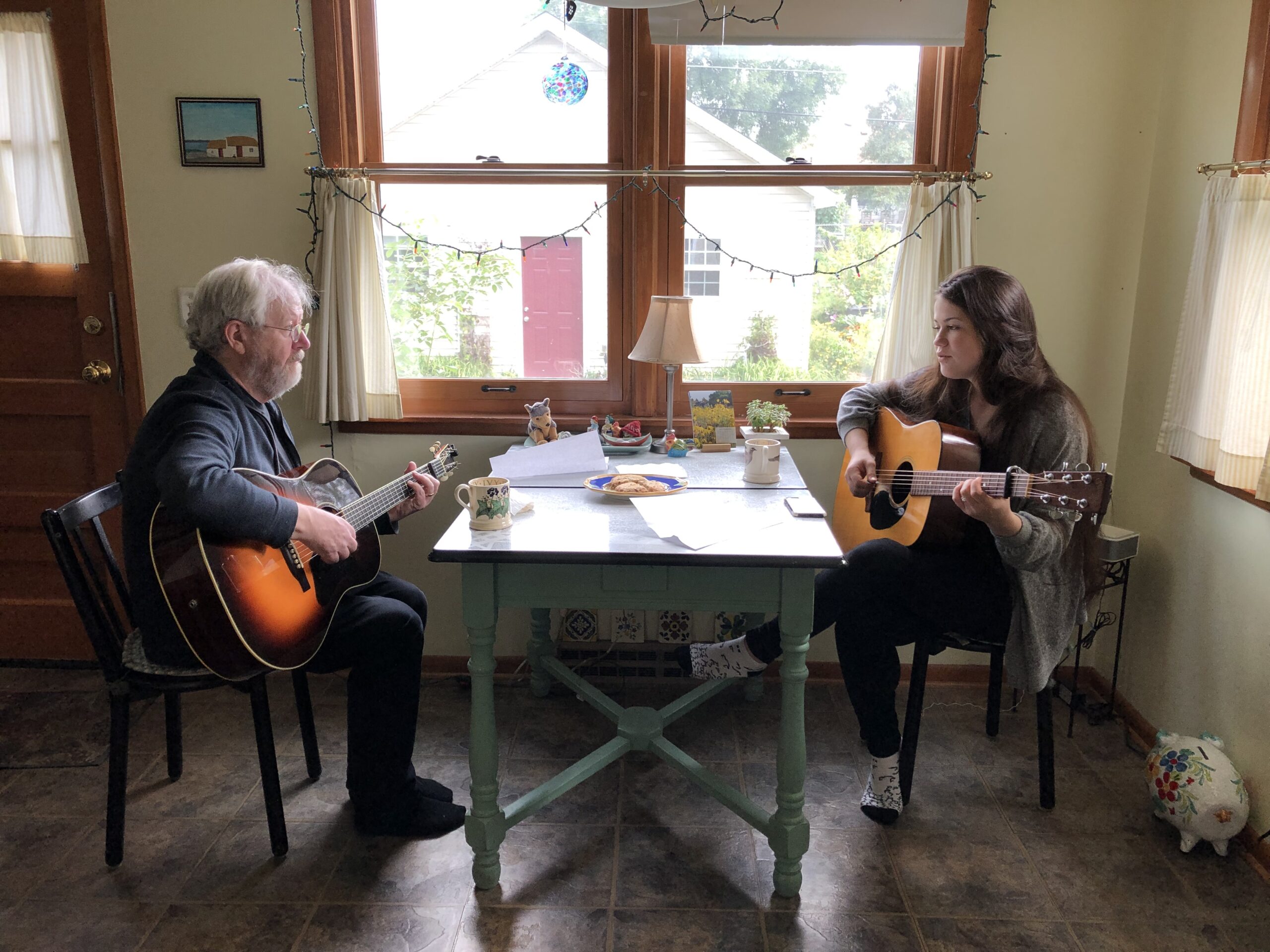
Dáithí and former student Victoria Pierce sharing some songs at his St. Paul home.
Sook Jin: What excites you about your Irish music journey?
Dáithí: From day to day, I get excited about various things. I am always obsessed with the fiddle -- how to approach it, phrase it, bow it. I try to look at it from different points of view. Recently I decided I would play faster at home, and that affects the bowing, so I think it is going well for a while. And then it might all collapse tomorrow and I might decide I'm actually not getting anywhere. But you keep on going if you’re obsessed. Obsession is crucial. Little excitements here and there, and connections.
I also get excited with things I discover that I can use in my classes. Just in the last week, Brian (Miller) sent me this thing: he’s just been given a book for the library, it came out in the early 1900s, songs and tunes collected in (mostly) Donegal. Another collaborator wrote words to them to make them into songs in a Victorian poetic style. This was the book that the song My Lagan Love came from. The second thing was, there’s at least one or two tunes in the book collected from a Robert Sproule from Kilmacrenan in Donegal. Robert has always been a Sproule family name! I had heard of this Robert Sproule before, because Francie Mooney, Mairéad Ní Mhaonaigh's father, got a tune from him - a version of Out of the Ocean. The connections there were exciting. In looking at the book, Brian came across another more recent Donegal fiddler, Jim Doherty who had Robert Sproule tunes -- this Doherty was a window on a style we hadn’t heard and might be a style the Sproules of my family would’ve had. All incredibly exciting connections!!
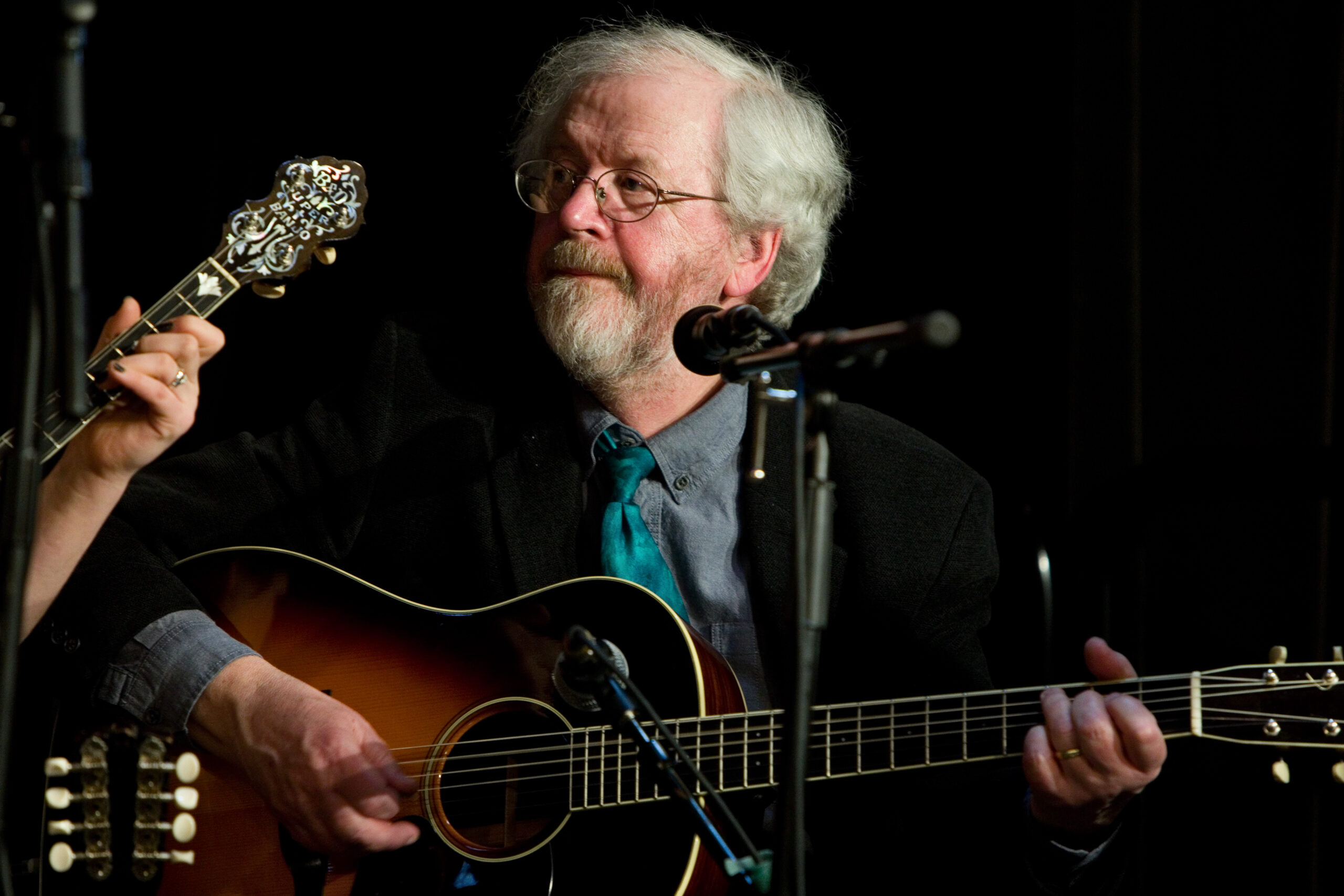
Dáithí Sproule teaches guitar, song, fiddle at the Center for Irish Music. A seminal figure in traditional Irish music, Dáithí was one of the first guitarists to use DADGAD tuning in Irish music. He is a long-time member of the band Altan, and has performed and recorded with many other great Irish musicians including Trian, Fingal, Skara Brae, Liz Carroll, Paddy O'Brien, James Kelly, and Tommy Peoples.
